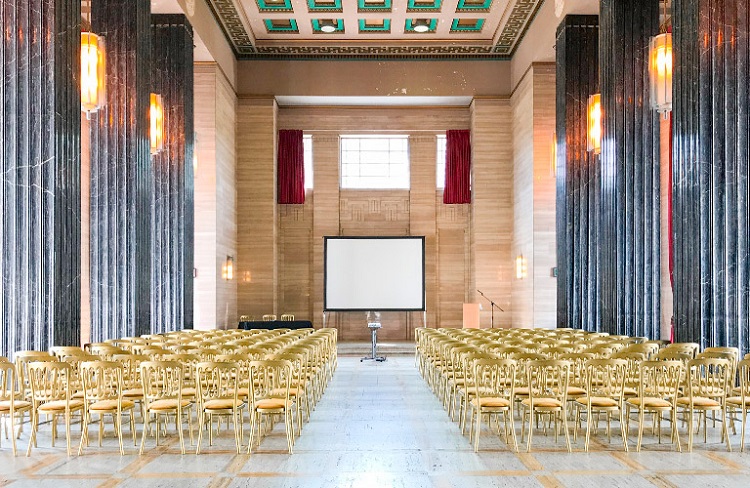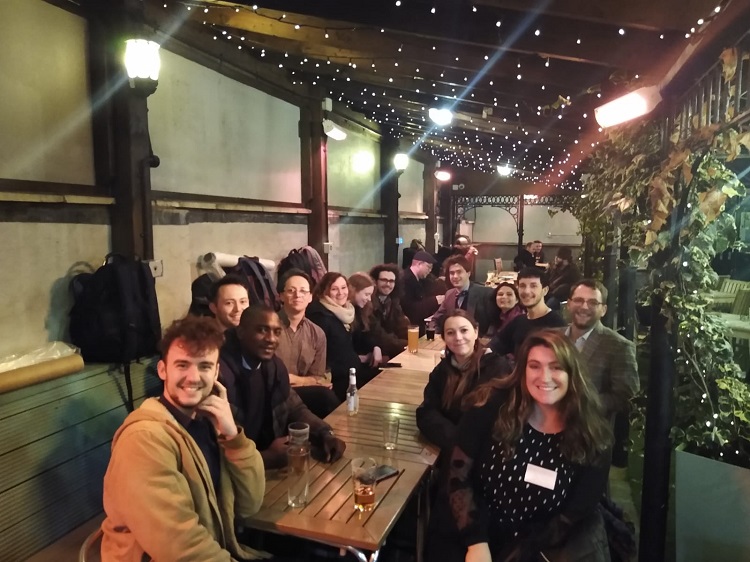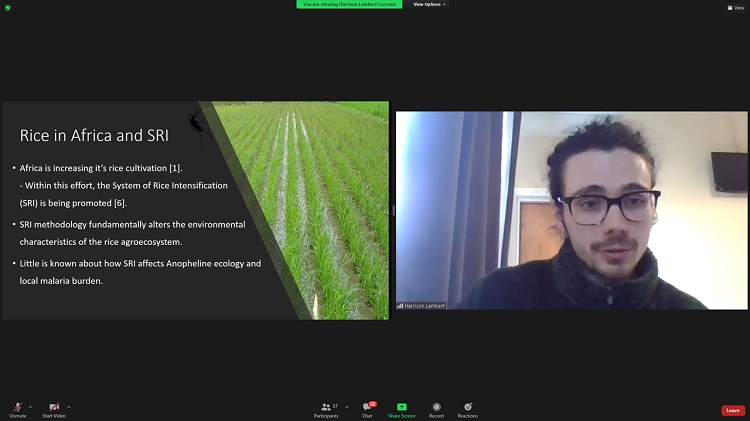The 2022 Royal Entomological Society (RES) Student Forum had been eagerly anticipated as being an in-person event after two years of virtual meetings due to Covid restrictions. The annual forum, organised by and for undergraduate and postgraduate students whose research is linked to entomology, gives participants the opportunity to give scientific presentations, network and share ideas with their peers. Three-time organiser, Manuela Carnaghi, and first-time presenter, Harrison Lambert, both PhD students at NRI, describe their excitement at meeting in person on day one, before Storm Eunice swept across the UK and forced a swift re-think and a quick return to virtual meetings.
Manuela
“We chose Cardiff as our location for the conference which was planned as a hybrid event with most people there in person, and some joining us online via Zoom. After two years of virtual meetings, I was craving face-to-face contact with proper interaction and networking opportunities. But there are also lots of advantages of joining a conference online; it meant we could invite participants from the United States, Bangladesh, India and from all over Europe so it did enable us to have the best of both worlds.
meetings, I was craving face-to-face contact with proper interaction and networking opportunities. But there are also lots of advantages of joining a conference online; it meant we could invite participants from the United States, Bangladesh, India and from all over Europe so it did enable us to have the best of both worlds.
However – the hybrid model only lasted for one day as the approaching storm and associated weather warnings meant that as joint organiser, I had to take the difficult decision late on Thursday afternoon, to move everything online for Friday’s sessions. We couldn’t ask people to travel to and from the venue as it was too risky from a health and safety point of view.
The venue itself would have been fine – we were in the Temple of Peace in Cardiff which is an old and very sturdy building – but with the storm raging outside I didn’t want anyone getting hit by debris or falling trees trying to get there.
The storm had already disrupted our Thursday sessions as the Severn bridge had been closed due to high winds, and trains were being cancelled, so some of our delegates only made it late on Thursday afternoon. Much of our preparation had been focused on making the environment covid-safe with optional mask-wearing, good ventilation and spacing. We hadn’t factored in the weather!
The highlight of day one was definitely the networking opportunities during coffee breaks and over lunch; the enthusiasm was infectious. At the end of the first day, we had a wine and pizza event which carried on in the local pub and was great fun.
 On day two, after we’d got the word out to everyone not to travel to the venue, we held a career session which helped our delegates think about what to do after their PhD and how to actually earn a decent living using their skills and qualifications. We also heard from our invited speakers who ranged from academics from the University of Cardiff, the Oxford University Museum of Natural History, and the American Museum of Natural History in the USA. Our students also spoke so it was a good mix.
On day two, after we’d got the word out to everyone not to travel to the venue, we held a career session which helped our delegates think about what to do after their PhD and how to actually earn a decent living using their skills and qualifications. We also heard from our invited speakers who ranged from academics from the University of Cardiff, the Oxford University Museum of Natural History, and the American Museum of Natural History in the USA. Our students also spoke so it was a good mix.
We had a post-doctoral researcher give a talk and he shared his experience of just how hard it had been for him to find a position straight after his PhD, which I personally found very interesting. It’s motivating to hear about other people’s journeys and to know that you are not the only one who is struggling.”
Harrison
“My big takeaway from the conference was to keep looking for opportunities and if you can’t find any, then make them for yourself. Opportunities can appear in many different forms – for example – if someone says, ‘would you like to work on this paper with me’, or offers you the opportunity to learn a new technique, or a job suddenly comes up – if you can say yes and balance it with your existing workloads, then you should.
Another moment of inspiration came from Chris Jeffs who spoke about alternatives to following an academic career. Chris described how he was all set up to be a very successful academic with papers coming out, doing great research –but over time he simply became personally disillusioned with academia and chose a different route for himself. It was good to hear that it’s not a failure to do that and if you decide research is not for you, then other paths are equally valid.
“I think some of us are hyper-critical of ourselves. It’s how we operate as scientists; we think, over-think, triple-think, re-read things many times, re-write even more times and finally submit with a shaky hand. This process can make us doubt our own judgement and abilities, as the more we learn, the more we realise how much more there is to learn. This conference was very helpful as we’ve missed out on so much during the pandemic – the ability to physically get together with our peers and swap stories and talk openly about our struggles – it’s a great help.”
a shaky hand. This process can make us doubt our own judgement and abilities, as the more we learn, the more we realise how much more there is to learn. This conference was very helpful as we’ve missed out on so much during the pandemic – the ability to physically get together with our peers and swap stories and talk openly about our struggles – it’s a great help.”
Manuela won’t be involved with next year’s forum, but she has some sound advice for her successor: “It’s an evolving event which exists to serve the needs of the entomological community at the time, so we invite speakers and put on events that help people fill in the gaps such as networking, careers – anything that offers practical help or inspiration.”
Harrison agrees: “this student forum is a very important space for students to present in front of an audience because even the process of preparing a presentation forces you to look at your message, work out what’s most important and what you need to get across. Even though the bad weather removed my chance to present in person, giving a talk in any circumstance is validating because you have to remind yourself that you are the one who knows most about this particular subject. Public speaking is a necessary skill that gets easier the more you do it.”
Manuela and Harrison were both impressed by an undergraduate student, Harry Fishlock, who paid out of his own pocket to attend this year’s conference, giving a talk containing such detail and with such enthusiasm that it won the prize for best presentation. They point to this as an example of the inclusivity and inspiration that the RES student forum offers.
To find out more about:

